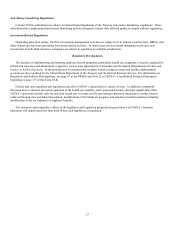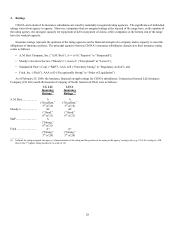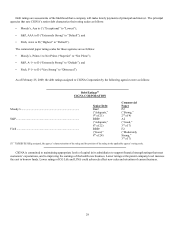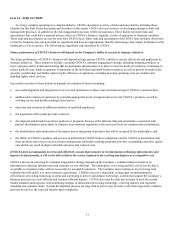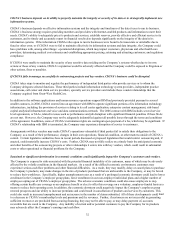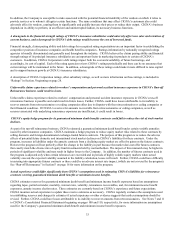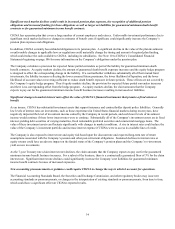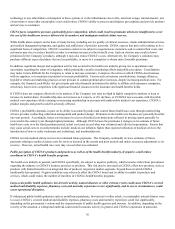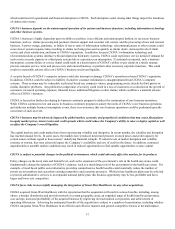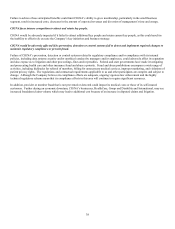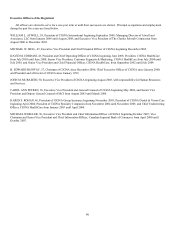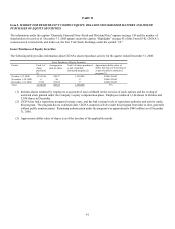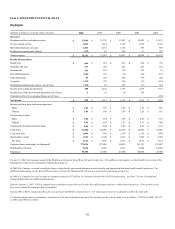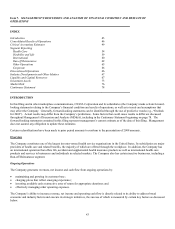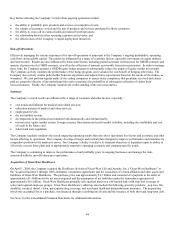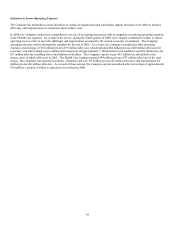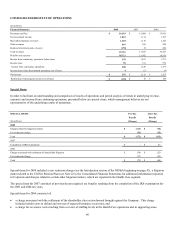Cigna 2008 Annual Report Download - page 57
Download and view the complete annual report
Please find page 57 of the 2008 Cigna annual report below. You can navigate through the pages in the report by either clicking on the pages listed below, or by using the keyword search tool below to find specific information within the annual report.
37
which could result in operational and financial disruption to CIGNA. Such disruption could, among other things impact the timeliness
of claims and revenue.
CIGNA's business depends on the uninterrupted operation of its systems and business functions, including information technology
and other business systems.
CIGNA’s business is highly dependent upon its ability to perform, in an efficient and uninterrupted fashion, its necessary business
functions, such as: claims processing and payment; internet support and customer call centers; and the processing of new and renewal
business. A power outage, pandemic, or failure of one or more of information technology, telecommunications or other systems could
cause slower system response times resulting in claims not being processed as quickly as clients desire, decreased levels of client
service and client satisfaction, and harm to CIGNA's reputation. In addition, because CIGNA’s information technology and
telecommunications systems interface with and depend on third party systems, CIGNA could experience service denials if demand for
such service exceeds capacity or a third party system fails or experiences an interruption. If sustained or repeated, such a business
interruption, systems failure or service denial could result in a deterioration of CIGNA’s ability to pay claims in a timely manner,
provide customer service, write and process new and renewal business, or perform other necessary corporate functions. This could
result in a materially adverse effect on CIGNA’s business results and liquidity.
A security breach of CIGNA’s computer systems could also interrupt or damage CIGNA’s operations or harm CIGNA’s reputation.
In addition, CIGNA could be subject to liability if sensitive customer information is misappropriated from CIGNA’s computer
systems. These systems may be vulnerable to physical break-ins, computer viruses, programming errors, attacks by third parties or
similar disruptive problems. Any publicized compromise of security could result in a loss of customers or a reduction in the growth of
customers, increased operating expenses, financial losses, additional litigation or other claims, which could have a material adverse
effect on CIGNA’s business.
CIGNA is focused on further developing its business continuity program to address the continuation of core business operations.
While CIGNA continues to test and assess its business continuity program to satisfy the needs of CIGNA’s core business operations
and addresses multiple business interruption events, there is no assurance that core business operations could be performed upon the
occurrence of such an event.
CIGNA's business may be adversely impacted by global market, economic and geopolitical conditions that may cause fluctuations
in equity market prices, interest rates and credit spreads which could reduce the Company’s ability to raise or deploy capital as well
as affect the Company’s overall liquidity.
The capital markets and credit market have been experiencing volatility and disruption. In recent months, the volatility and disruption
has reached unusual levels. In some cases, the markets have produced downward pressure on stock prices and credit capacity for
certain issuers without regard to those issuers’ underlying financial strength. If current levels of market disruption and volatility
continue or worsen, they may adversely impact the Company’s availability and cost of credit in the future. In addition, continued
unpredictable or unstable market conditions may result in reduced opportunities to find suitable opportunities to raise capital.
CIGNA is subject to potential changes in the political environment, which could adversely affect the markets for its products.
Policy changes on the local, state and federal level, such as the expansion of the government’s role in the health care arena, could
fundamentally change the dynamics of CIGNA’s industry, such as a much larger role of the government in the health care arena. For
example, a broad based public sector alternative providing comprehensive health benefits could materially reduce the number of
private sector members and exacerbate existing competitive and economic pressures. While private healthcare plans may be solicited
to provide administrative services to an expanded national public plan, this business opportunity may be less profitable and favor
larger and lower cost competitors.
CIGNA faces risks in successfully managing the integration of Great-West Healthcare (or any other acquisition).
CIGNA acquired Great-West Healthcare with the expectation that the acquisition will result in various benefits, including, among
others, a broader distribution and provider network in certain geographic areas, an expanded range of health benefits and products,
cost savings, increased profitability of the acquired business by improving its total medical cost position, and achievement of
operating efficiencies. Achieving the anticipated benefits of the acquisition is subject to a number of uncertainties, including whether
CIGNA integrates Great-West Healthcare in an efficient and effective manner, and general competitive factors in the marketplace.


